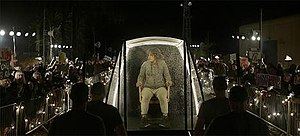White Bear (Black Mirror)
| "White Bear" | |
|---|---|
| Black Mirror episode | |

Victoria (Lenora Crichlow) is exposed to the anger crowd. This scene exemplifies an eagerness for "an eye for an eye" punishment existing in the society. One reviewer said it "attacks our current culture" trend of "dressing up the humiliation of others in the name of entertainment."
|
|
| Episode no. |
Series 2 Episode 2 |
| Directed by | Carl Tibbetts |
| Written by | Charlie Brooker |
| Original air date | 18 February 2013 |
| Running time | 44 minutes |
| Guest appearance(s) | |
|
|
"White Bear" is the second episode of the second series of British science fiction anthology series Black Mirror. It was written by series creator and showrunner Charlie Brooker and directed by Carl Tibbetts, and first aired on Channel 4 on 18 February 2013, when it was watched by 1.2 million viewers.
The episode is about a woman (Lenora Crichlow) who does not remember who she is and wakes up in a place where almost everybody is controlled by a television signal. Along with one of the few unaffected women (Tuppence Middleton), she must stop the "White Bear" transmitter while some people try to kill them both. Brooker originally wrote an apocalyptic story, but when they were to film the script in a former U.S. Air Force base he changed it because of a fence he saw there. He rewrote it in two days, and removed some details that may be useful for a sequel story. The main change was done on its end; a plot twist was added—and this twist would be highlighted as the most impressive aspect of the episode by most reviewers.
The episode is said to draw parallels with real murder cases, mainly the 1960s Moors murders, when five children were killed. Its horror aspects are reminiscent of the 1970s film The Wicker Man and the video game Manhunt, while some similarities with The Twilight Zone have also been noted. This dystopian episode reflects upon several aspects of contemporary society, such as media coverage of murders, technology effects on people's empathy, desensitization, violence as entertainment, vigilantism, the concept of justice and punishment, and what is reality.
...
Wikipedia
